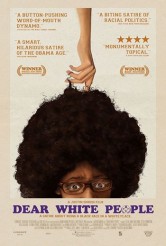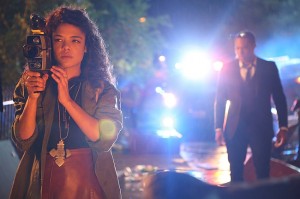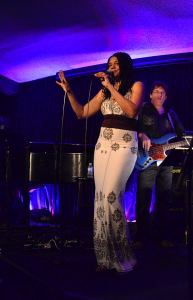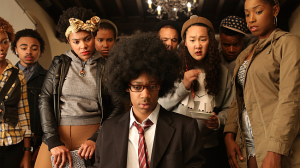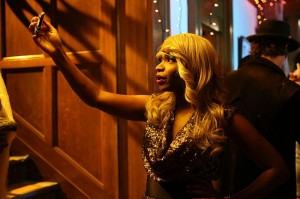For a country where some people can congratulate themselves for electing a black President, it often seems that America is more behind the times then ever, both in lethally law-enforced terms, and artistic ones where “black” entertainment more often than not engages in minstrel show drama and humor. For an “enlightened” Hollywood that engages in “some of my best friends” lip service, it’s particularly disappointing when the precious few black film composers are kept by The Man in a musical ghetto where only brown color applies. It’s the kind of can’t-we-all-just-get along attitude that would make any self-respecting minority get outraged, let alone the students at tony Winchester University, whose biting voice of protest is the not-so ironically named Samantha White (Teresa Thompson), whose blisteringly hilarious podcasts give this Sundance winner its name.
As written and directed by Justin SImien, DEAR WHITE PEOPLE comes across like SCHOOL DAZE as made by METROPOLITAN‘s Whit Stillman, with its central conflict being as much between image-conscious black students as it is their white counterparts’ desire to make themselves part of their culture – satirically thoughtless stereotyping that comes to a boil at a Halloween party which becomes this movie’s version of a trash can hurled through the window of a Brooklyn pizzeria. However,DEAR WHITE PEOPLE is way too Ivy-league smart to throw its can with hip-hop, shuck n’ jive clichés that other black filmmakers lower themselves to, with composer Kathryn Bostic particularly standing up to embody Simien’s satirically cool, Ivy League-level scripting and directorial style.
Toss away the color of DEAR WHIE PEOPLE and you’ll find the “snobs versus slobs” appeal that’s made for the college comedy genre since the landmark ANIMAL HOUSE, which pitted misfits against the sniggering rich boys – except here the once-outcast students have already been co-opted. It’s a theme that informs Bostic’s super-intelligent approach, especially in its lush, aristocratic themes that stand for distinctly un-urban characters thrust into a white environment that’s desperate to show just how class-conscious it isn’t. Her music does wonders with Simien’s razor-sharp takedowns, where dialogue abounds racial references as much as it does pop culture call outs to GREMLINS and Taylor Swift. For if you hear a familiar, catchily cool percussive take on a certain classical piece that got BARRY LYNDON an Oscar for score adaptation, then they won’t be mistaken. When it comes to the jazz music that one black character dares to admit disliking, Bostic’s cool combo swings from Ellington-esque jazz romance to uptempo rhythm that bring to mind Bill Lee’s seminal score for his director son’s breakthrough SHE’S GOTTA HAVE IT. And for the climactic Halloween party riot, Bostic brings together electric guitar overload and drum percussion in a way that will have you applauding as the evil fratboys get a taste of not-so civil protest.
DEAR WHITE PEOPLE has gotten a major push from its Special Jury Prize at Sundance, a counter-culture film haven that’s also given no small amount of inspiration to Bostic. It’s now given her career its biggest push yet after a range that’s encompassed her own concert appearances and playing beside such artists as Ryuichi Sakamoto and David Byrne, on-camera musical appearances in shows like BROTHERS & SISTERS and a long career in both television and film that’s recently included such well-regarded indie features as I WILL FOLLOW and MIDDLE OF NOWHERE. Though her scoring identity has displaying an entrancingly ethereal and melodic voice that’s driven by strong-willed characters, Bostic herself isn’t a woman who’s about to get on a microphone to give a Samantha-level protest at being one of the precious few black female composers, especially in a town that can’t wait to traffic jam for an Obama fundraiser, while simultaneously pigeonholing most of its media musicians who happen to be black. Instead, Bostic prefers to let her chill scores speak for themselves, which it does with an especially smart, impressively melodic bite in DEAR WHITE PEOPLE a film whose incredibly intelligent voice promises many of its participants will be heard loud and clear in the future, no more so than Kathryn Bostic’s.
ASSIGNMENT X: Tell us about your musical upbringing, and what made you want to be a composer?
KATHRYN BOSTIC: I grew up listening to everything from classical, jazz, r&b, rock and more, my parents loved music and my mother was a classical pianist and teacher. I started playing the piano when I was 3 and was always coming up with these little melodies that I’d play and sing around the house. As I grew older, I appreciated more and more how listening to music made me feel and wanted to sing and create my own music. I was in a few bands in high school and college and we’d have these intense jam sessions that would later become more defined musically. In college I started writing music for dance, theater, and short films and really enjoyed the way music worked in these collaborative contexts.
AX: Were there any black composers who influenced you in particular, or was it film music in general?
BOSTIC: Listening to the wide range of music that I did while growing up brought me to a phenomenal treasure trove of black composers including William Grant Still, Ulysses Kay, George Walker, Margaret Bonds, Duke Ellington, Quincy Jones, Isaac Hayes, Marvin Gaye…I mean I could go on and on. They are all such extraordinary innovators of rich textures and amazing emotional depth. Definitely big influences for me. These are all cutting edge and visionary composers.
AX: How did your time at the Sundance composer lab give you an insight into the kind of “indie” scores that go into making the kind of movies that do well at the festival like DEAR WHITE PEOPLE?
BOSTIC: For me the Sundance Composers Lab is more about the craft of film scoring in and of itself. The lab helps to refine tools about music as story telling for film. It provides a hands-on process to explore palette, genre choices, and overall stylistic instincts. The mentoring is incredible, I mean you have some of the top studio composers right there with you giving you insight and inspiration. The Sundance Composers Lab also creates an environment where you learn more and more about the art of collaboration with a director and what it means to be a part of a creative team that is shaping the film. It was one of the most beneficial and affirming events I’ve had as a film composer. They’ve recently expanded the labs to include a sound design team at Skywalker and that experience was amazing. Being a part of these labs was a crucial factor in my deciding to actively pursue film scoring.
AX: How did that fact that this was Justin’s debut as a feature director, and screenwriter affect your work? And was it an easier collaboration given that you were both black, and drawing from that experience?
BOSTIC: I treated scoring this film the way I treat all my scoring jobs regardless of race and what film it is chronologically for a director. As a film composer, my task is to write music that serves the film, and have a creative chemistry between myself and the director that enables this. Justin and I had worked together before, so there was already a synergy and creative simpatico. You could argue that a composer’s race or cultural background is an essential in scoring certain films and I suppose in some cases that may be true, in this case it was about being able to deliver Justin’s vision for the score.
AX: DEAR WHITE PEOPLE is shot in a very subtle, almost cold way that’s the antithesis of “black” films where characters are mugging to the camera. How did that play into your approach?
BOSTIC: My approach to the score was very much like Justin’s approach in creating this film, veering away from the traditional musical anecdotes that often underscore many of today’s’ black Hollywood films with typical comedic hits or deep and searing melodramatic swagger. He wanted something fresh and innovative which gave me room to be quirky without being clichéd. He had very specific ideas about the music and wanted the score to defy the expected and the norm. So there would be a moment where Swan Lake is the underscore and it bumps into a Bebop jazz moment that turns into an electronic trance groove that morphs into a Ligeti sound alike or a song. So there’s a great montage of seriousness mixed in with sly comedy and the score reflects that. Justin has a great instinct for music not only carrying a scene but being its own character playing off the actual characters in the scene. He wanted the music to be able to stand on its own and not have a presence that was exclusively tangential and in the background. At first I thought this would get in the way of the dialogue and emotional momentum already there through the characters, but the way he places the music really helped to further define these moments.
AX: You make particularly fun use of Schubert’s Piano Trio in Eb 2nd movement, which is most familiar to music fans for its thematic use in the soundtrack of BARRY LYNDON. How did this piece end up in the score?
BOSTIC: Justin is a huge Stanley Kubrick fan and in subtle homage to him, Justin wanted that particular theme from BARRY LYNDON to be re-created in different ways to underscore the masks and persona of the characters.
AX: Beyond Schubert, how did your music want to satirize the snooty nature of academia, especially when black pop culture references were thrown into it?
BOSTIC: I think the music in this film was used in a way that again has all these milieus and attitudes bumping up against each other and at times “fighting” for their own musical turf and identity just like the students in the film. There’s an instant assumption that classical music is going to reference academia high “brownishness” and yet at the same time it’s also used to underscore pretentiousness and inner workings of a character like Coco. These characters are not one-dimensional, they have complexities about their own sense of identity and race heightened in this academic environment so the score is a mosaic of these various attitudes and conflicts. I really appreciated this approach in working on the score. Justin was very masterful in laying out the blueprint for this.
AX: What’s your favorite joke, or scene in the film, and why? Is there something you agreed with it that white people would just “get” about blacks?
BOSTIC: Let’s just say I love the poster for this movie…this about says it all and I have experienced this a number of times LOL and not so LOL!
AX: I think a lot of people are going to compare DEAR WHITE PEOPLE to SCHOOL DAZE. Do you think it’s similar, especially when it comes to the differences in attitude between Justin and Spike Lee? Or in the use of music?
BOSTIC: I think those comparisons are understandable to the extent that both films take place on college campuses and deal with identity and race in biting satire and serious truth telling.
AX: Your scores for MIDDLE OF NOWHERE, I WILL FOLLOW and even scenes in DEAR WHITE PEOPLE seem to share a mellow, ethereal mood. How do you think that reflects your personality, and melodic approach?
BOSTIC: These scores, in those moments, reflect the mood and emotional intent the directors wanted me to convey and create. So that ethereal tone was what they specifically wanted.
AX: Beyond film, you’ve also done theatrical scores for August Wilson and Rajiv Joseph’s BENGAL TIGER AT THE BAGHDAD ZOO. What do you think the biggest differences are between those two forms of scoring, especially when it comes to accompanying action?
BOSTIC: One of the main differences is that theater is real time and live so the timing of the music used to underscore or hit a point of action is going to vary in each performance in terms of timing. Theater scoring is tied more to the script where film scoring is locked into visual points that are not fluid that way. Both require the music to elevate the emotional arc of a scene or scene transition.
AX: Tell us about your work as a singer and songwriter?
BOSTIC: I’ve always enjoyed singing and songwriting, for me it’s a great form of composing and storytelling. I’ve been a backing vocalist for some amazing entertainers in the studio and on the road, including Ryuchi Sakamoto, k.d. Lang, Nas, Dave Byrne, and John Hiatt. I was inspired by their original and innovative artistry. I learned so much from them and realized that I wanted to create more of my own material and give voice to that. I’ve also done quite a bit of session singing on extraordinary scores by major hollywood composers that include John Williams, James Newton Howard, Hans Zimmer, John Powell and many more. This has given me insight into how the voice is used as ensemble to elevate a particular scene.
When I’m at the piano there’s a fluidity that I really give into while playing, the lyrics usually follow the music and my songs kind of write themselves this way. I’ve been fortunate to hear and develop my ideas with some incredible musicians including Darryl Jones, Will Calhoun, Ricky Peterson, Keb Mo and Herman Matthews. I’m currently working with some really serious players who are patiently helping me “marinate my vibe” as I like to say. Special shout out to Abe Lagrimas Jr., Andrew Synowiec, Dan Pearson, Mitch Forman, Jamieson Trotter, Ross Garren and Ken Stacey. We play at local venues quite a bit so I get to hear my songs and compositions with an organic dynamic that really helps me to further define the music. I am deeply appreciative of this community and ultimately I take it back to where it starts, home while I sing, play the piano and see what the muse has in store for me.
AX: What’s your reaction to people who might label you as a “black female film composer,” as opposed to just “film composer?” And do you think being in that minority can help, or hinder one’s chances?
BOSTIC: If someone chooses to put me in a category and define me exclusively that way, then that’s what that is for them. I certainly embrace that I’m an African American woman and more, but deeper than that point of reference is my soul as an artist. That’s the place I write and create from and it’s always been that way, I didn’t sit at the piano at age three and say. “Here I am a little black girl playing the piano,” I just played the piano and wrote my songs. Obviously as I’ve gotten older the socialization, perceptions and projections about being black, about being a woman developed an awareness in me that also became a part of me. The awareness is absolutely there but doesn’t define me. I have always had an intrinsic instinct about being musically creative that transcends this. I believe those people who like what I do will want to work with me and this won’t necessarily be based on race or gender. It’s unfortunate that we still have to have these types of conversations because to me labels can potentially minimize and artificially define the depth of the work itself. There’s so much baggage with labels. It’s ultimately about the music…compose music that will serve the film in a way that’s effective and transformative.
AX: Back in the day composer like Quincy Jones could score any kind of subject. Now it seems that black composers in general get “ghetto-ized” into only being considered for films that deal with black characters, or subject matter? Why do you think that is? And what’s your plan make people see you beyond those barriers?
BOSTIC: I think film scoring is a hard nut to crack for anybody. Indeed, white males comprise the majority of the film and TV scoring community, the competition overall is very high and people tend to hire based on relationships that have been cultivated. For that matter, where are the Asian, Latino, Native American and women composers in mainstream film and TV scoring? The broader and important issue is providing music courses in the schools. There is a huge void in this area and kids are not being taught the basics of how to read or write music. That already creates a huge imbalance insofar as who is being encouraged, mentored and educated for this. There are so many talented kids from diverse cultural and racial backgrounds but the public school system needs to prioritize music education and mentor kids who aren’t able to afford private lessons and instruments. I think this has had an impact on the overall perception that there are no people of color composing music for film. I find the term “minority” to be pejorative and code for “less than” not only in numbers but in capability. This perception is confounding and false. I also think a mechanism for change is for directors and producers who are in a position to hire, to really want to think outside their comfort zone and make a concerted effort to look for and hire amazing talent beyond their “go to” roster. Ultimately the music, the score is what’s important and my “plan” is to focus on that with creative integrity and imagination that works for the film.
AX: What do you hope that black, and white audiences take away from DEAR WHITE PEOPLE? Do you want them to be outraged in a way that goes beyond the humor?
BOSTIC: I think the dialogue about race and identity are important and can’t continue to be swept under the rug or air brushed to fit into media savvy campaigns and programming about this group or that group. These are very transparent times and everything is up for scrutiny and reveal. This film definitely provokes much needed discussion about stereotypic attitudes that are being confronted and exposed.
Kathryn Bostic’s score for DEAR WHITE PEOPLE wil be available soon online soon from Lakeshore Records.
Visit Kathryn Bostic’s website HERE
Follow us on Twitter at ASSIGNMENT X
Fan us on Facebook at ASSIGNMENT X
Article Source:Assignment X
Article:Interview with DEAR WHITE PEOPLE composer Kathryn Bostic
Related Posts:




